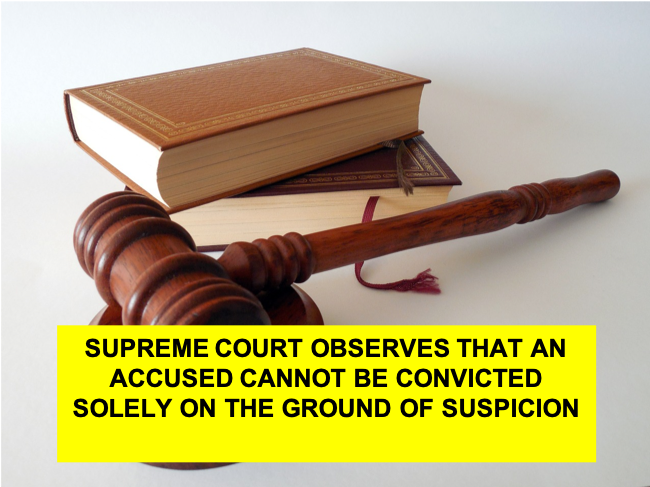SUPREME COURT OBSERVES THAT AN ACCUSED CANNOT BE CONVICTED SOLELY ON THE GROUND OF SUSPICION
A Two Judge Bench of the Hon’ble Supreme Court of India comprising of Justice B.R Gavai and Justice Pamidighantam Sri Narasimha in the matter of Ram Niwas vs. State of Haryana Criminal Appeal No. 25 of 2012 passed a Judgment dated 11-08-2022 and while allowing the Appeal held that the Accused cannot be convicted solely on the ground of suspicion.
Facts
In the present case, the Deceased, Dalip Singh, P.W 10, Bhim Singh and the Complainant, Deep Chand (P.W 9) were brothers. The son of Bhim Singh, Pale was married to Sunita, the daughter of one, Chander Singh and sister of the Accused-Appellant, Ram Niwas. Sunita and her minor son went to her parental house after the death of her husband, Pale. After the death of Pale, the Deceased wanted Sunita to marry his son, Rampal. On 07-03-2003, the Deceased along with the Complainant and P.W 10, Bhim Singh went to the Accused-Appellant’s house with the marriage proposal. At around 7:30 pm, the Deceased while consuming liquor with the Accused-Appellant, mentioned about the marriage proposal and the Accused-Appellant started abusing the Deceased. However, the Complainant and Bhim Singh intervened and managed to calm down the Accused-Appellant. Thereafter, both of them had their meals and went to sleep on the first floor. When the Complainant and Bhim Singh entered Chander Singh’s drawing room on the morning of 08-03-2003, at around 6.30 a.m., the Deceased was not present. When they repeatedly enquired about the whereabouts of the Deceased, the Accused-Appellant did not give a satisfactory response. When they finally went to the courtyard to look for the Deceased, they sensed a smell of the burnt human body and after repeated enquiry, the Accused-Appellant became nervous and revealed that he had strangled the Deceased and burnt him. The dead body of the Deceased was covered in Paddy Fodder. When the Complainant and Bhim Singh confronted the Accused-Appellant, he fled away from the spot.
The Complainant and Bhim Singh went back to their village and returned with other family members to the crime scene in the evening. The Complainant lodged a report at the Police Station at 4:45pm and on the basis of the statement, an FIR was lodged with the charges for offences punishable under Sections 302 of the Indian Penal Code (IPC) (Punishment for Murder) and Section 201 IPC (Causing disappearance of evidence of offence, or giving false information to screen offender). The Accused-Appellant pleaded not guilty before the Trial Court. On 12-01-2005, the learned Sessions Judge convicted the Accused-Appellant. The Accused filed an Appeal before the High Court of Punjab and Haryana and the High Court vide Order dated 16-03-2009, dismissed the Appeal. Hence the present Appeal has been filed before the Supreme Court.
Judgment
The Apex Court observed that it was evident that even though the Complainant and Bhim Singh saw the Deceased’s body in paddy fodder, they did not inform anyone in their village. They also acknowledged that they arrived in their village at around 9.00 a.m but they did not alert the police until 2:30 or 3:00 pm. The only other circumstance on which the Prosecution relies is the seizure of ‘ash’ kept in the plastic bag on the memorandum of the Accused-Appellant under Section 27 of the Evidence Act 1872 (How much of information received from accused may be proved). The Prosecution case purely rests on circumstantial evidence.
Thus, the Apex Court observed as follows:
- This Court has held that there has to be a chain of evidence so complete so as not to leave any reasonable ground for a conclusion consistent with the innocence of the accused and must show that in all human probability the act must have been done by the accused. It has been held that the circumstances should be of a conclusive nature and tendency. This Court has held that the circumstances should exclude every possible hypothesis except the one to be proved. It has been held that the accused ‘must be’ and not merely ‘may be’ guilty before a Court can convict.
- It is settled law that the suspicion, however strong it may be, cannot take the place of proof beyond reasonable doubt. An accused cannot be convicted on the ground of suspicion, no matter how strong it is. An accused is presumed to be innocent unless proved guilty beyond a reasonable doubt.
- In the present case, we find that the prosecution has utterly failed to establish the chain of events which can be said to exclusively lead to the one and only conclusion, i.e., the guilt of the accused. In that view of the matter, we find that the judgment and order of the learned Sessions Judge and that of the High Court are not sustainable.
Thus, the Supreme Court held that the Prosecution has failed to establish the chain of events which can prove the guilt of the Accused. The Appeal was thus allowed and the Orders of the Trial Court and the High Court were quashed and set aside. Hence, the Accused was acquitted of all the charges.
Priyanshi Pandey
Associate
The Indian Lawyer & Allied Services





































Leave a Reply